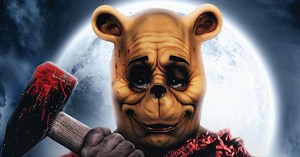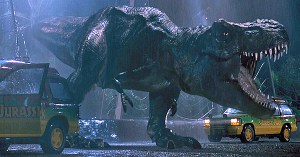Have You Seen These 10 Acclaimed Movies Featuring Law & Order Stars?
In this week's Total Recall, we look at some of the best big screen work the stars of L&O have done.
Law & Order: Special Victims Unit starts its 17th season tonight, further expanding a franchise that’s accounted for more than 1,000 hours of programming — and counting. In honor of its return, we’ve assembled a list of some of the more well-reviewed movies from the filmographies of L&O cast members past and present, and you know what that means… It’s time for (DUN DUN) Total Recall!
Eric Bogosian –

Few actors have moved between stage and screen as smoothly and successfully as Eric Bogosian. Not only is he an accomplished monologuist, published novelist, and Pulitzer-nominated playwright, he’s also spent the last few decades turning in reliably excellent work in a variety of far-flung locations, taping episodes of Miami Vice, Reading Rainbow, and Scrubs (just to name a few) before beginning his lengthy run as Capt. Danny Ross on Law & Order: Criminal Intent. A number of Bogosian’s plays have received the big-screen treatment, but we recommend starting with the film adaptation of his Pulitzer-nominated Talk Radio — not only because the central role of acerbic radio DJ Barry Champlain is perfect for him, but because it attracted the attention of Oliver Stone during its stage run, and Stone’s version (which won the Silver Bear at the Berlin Film Festival) has remained mostly overlooked since tanking at the box office. The movie’s failure, while disappointing, was perhaps inevitable; almost gleefully abrasive, it used the death of a real-life disc jockey murdered by white supremacists as a springboard onto a cinematic forum for 110 minutes of angrily inveighing against the state of late-1980s America, and even the most enthusiastic reviews acknowledged that the end results weren’t for everyone. “The film has a purposefully repellent but fascinating quality,” wrote Gene Siskel for the Chicago Tribune. “Bogosian’s performance, based on his stage play, is spectacularly demented.”
Vincent D’Onofrio –

A Method actor who helped support himself during his early years by bodyguarding for the likes of Robert Plant and Yul Brynner, Vincent D’Onofrio is one of the more fascinating fellows in a franchise full of them — a guy whose career includes everything from an Emmy-nominated appearance on Homicide: Life on the Street to live shows as “country singer” George Geronimo Gerkie, as well as an eclectic list of small-screen credits that includes playing Wilson Fisk on Marvel’s Daredevil and more than 140 episodes as Det. Bobby Goren on Law & Order: Criminal Intent. D’Onofrio’s also enjoyed significant success on the big screen, putting together a filmography that boasts creepy drama (The Cell), sci-fi/comedy (Men in Black), and at least one ‘80s cult classic (that’s him playing “Thor” in Adventures in Babysitting) — but here we’re focusing on his breakout performance as Pvt. Leonard “Gomer Pyle” Lawrence in Stanley Kubrick’s Full Metal Jacket, a role for which he gained an incredible 70 pounds while hurling equally impressive emotional weight into a harrowing look at the Vietnam War. “This is the most tightly crafted Kubrick film since Dr. Strangelove, as well as the most horrific,” marveled the Chicago Reader’s Jonathan Rosenbaum. “The first section alone accomplishes most of what The Shining failed to do.”
Jill Hennessy –

Jill Hennessy has had the good fortune to land leading roles in a pair of long-running series, and earned critical acclaim for her work on both shows: As A.D.A. Claire Kincaid on Law & Order, she was nominated for a Screen Actors Guild Award, and she later took home a Gracie Allen Award for Outstanding Lead Actress in a Drama Series during her six-year run on Crossing Jordan. Perhaps as a result, her big-screen appearances have often come in the form of supporting roles, but if you’re looking for a well-reviewed film that gives Hennessy a healthy amount of screen time, you might want to start with Small Town Murder Songs. Written and directed by Ed Gass-Donnelly, this Canadian indie lives up to its title, telling the story of a middle-aged cop (Peter Stormare) whose tenuous standing with his community is tossed for a violent loop when he discovers the grisly result of the town’s first murder in decades. The result, wrote Mark Holcomb for the Village Voice, is “boldly succinct yet confident enough to take its time.”
Ice-T –

No surprises here, right? While Ice-T’s filmography includes plenty of cult favorites — his extensive list of credits starts with appearances in both Breakin’ movies and includes the bananas Gary Busey/Rutger Hauer action movie Surviving the Game, as well as the John Wayne Bobbitt production Frankenpenis — but if you’re after a hard-hitting drama that just happens to star the guy who’s played Odafin “Fin” Tutuola on Law & Order: Special Victims Unit for the last 15 years and counting, your search should begin with New Jack City. Mario Van Peebles’ 1991 hit might follow some familiar narrative beats as it recounts the journey of an NYPD detective (Ice-T) who goes undercover to infiltrate the criminal enterprises of a rising drug dealer (Wesley Snipes), but it does so with a fair amount of panache — not to mention a bestselling soundtrack. (It’s also the album that gave the world Color Me Badd, but hey, nobody’s perfect.) “Van Peebles wanted to tell this story,” wrote the Washington Post’s Hal Hinson. “His heart is in it, and it’s got a killer beat.”
Michael Moriarty –

A multi-faceted artist whose background boasts a jazz discography as well as a list of film credits that runs the gamut from Bang the Drum Slowly to It’s Alive III: Island of the Alive, Michael Moriarty is an all-around fascinating fellow — and one whose tumultuous exit from his Emmy-nominated Law & Order role as Executive A.D.A. Ben Stone, as commemorated in his memoir The Gift of Stern Angels, could fill a season or two of its own show. He was offered one of his better chances to shine on the big screen in Pale Rider, Clint Eastwood’s 1985 Western about a mysterious stranger (natch) who shows up at a mining camp just in time to save its desperate inhabitants from ruinous persecution at the hands of a deep-pocketed thug (Richard Dysart); playing Hull Barret, who befriends Eastwood’s character after being saved from a beating and ultimately helps shoulder the burden of rescuing the town, Moriarty helped round out what the New York Times’ Vincent Canby appreciatively deemed “the first decent Western in a very long time.”
Jerry Orbach –

Jerry Orbach’s 12-year Law & Order run made him a franchise icon, but his career was so impressively eclectic — and consistently distinguished — that by the time he started working on the series in 1992, he’d already landed a series of landmark roles, starting with a string of stage performances (The Fantasticks, Chicago, 42nd Street) and film parts that endeared him to audiences of all ages (including Baby’s dad on Dirty Dancing and the voice of Lumière in Beauty and the Beast). Nestled among his vast filmography is his appearance in Sidney Lumet’s Prince of the City, a fact-based drama about a corrupt New York cop (Treat Williams) whose decision to cooperate with an internal affairs investigation puts the careers of his colleagues (including one of his closest friends on the force, a detective played by Orbach) at risk. “After the film starts to turn itself over in your mind, it becomes a much deeper piece,” wrote Roger Ebert, calling Prince “a film about how difficult it is to go straight in a crooked world without hurting people you love.”
Fred Thompson –

If Fred Thompson were a fictional character, he’d be derided as unbelievable — a guy whose first film credit came playing himself in a movie (1985’s Marie) about a court case he’d worked on as a real-life attorney, and whose non-Hollywood accomplishments include a nine-year Senate run and a brief presidential campaign. Along the way, Thompson became one of the industry’s first choices for characters who projected an air of gruff authority, appearing as military men, police detectives, and intelligence officers in a string of features that included everything from Die Hard 2 and Iron Eagle III to Curly Sue — and a five-year run on Law & Order as District Attorney Arthur Branch. In 1993’s In the Line of Fire, Thompson played the White House Chief of Staff, butting heads with a Secret Service agent (Clint Eastwood) whose guilt over failing to prevent John F. Kennedy’s assassination makes him an easy target for a psychotic ex-CIA agent (John Malkovich) who plans to kill the current president. “It just builds, relationship by relationship, detail by detail, clever stroke by clever stroke, taking you in and making you its own,” wrote the Baltimore Sun’s Stephen Hunter. “It ought to wear a sign: Danger. Professionals At Work.”
Sam Waterston –

Sam Waterston has had a pretty amazing career all the way around, and his filmography boasts no shortage of significant work for television and the big screen. But for a harrowingly persuasive example of what he’s truly capable of as a dramatic actor, it’d be hard to argue against his Oscar-nominated performance in The Killing Fields, director Roland Joffé’s 1984 dramatization of the plight endured by Cambodian journalist Dith Pran (played by Dr. Haing S. Ngor) after Phnom Penh is overrun by the Khmer Rouge during the Vietnam War and Pran stays behind to help his American colleague and friend, future Pulitzer winner Sydney Schanberg (Waterston). A grim look at the bonds of moral obligation as well as a scathing indictment of the notoriously totalitarian regime’s horrific genocide, Fields is sobering stuff; as Adrian Turner wrote for Radio Times, “Few feature films have captured a nation’s agony more dramatically than Roland Joffé’s The Killing Fields.”
Dianne Wiest –

The TV landscape has been so thoroughly dotted with procedurals over the last couple of decades that it’s easy to be cynical about the genre, even one as venerable as the Law & Order franchise. But if you ever find yourself wondering how L&O managed to turn such a simple formula into a network mainstay, just think about Dianne Wiest, whose awards-speckled résumé is as impressive as it is typical of the type of talent the show’s tended to hire over the years. The owner of two Academy Awards, two Emmy Awards and a Golden Globe Award, Wiest built an incredible career before walking onto the Law & Order set for the first episode of her two-season run as D.A. Nora Lewin, and it’s all but impossible for us to pick just one high point out of her filmography — but every journey has to begin somewhere, and you could do a lot worse than starting your Wiest viewing with her Oscar-winning turn in Bullets Over Broadway, Woody Allen’s 1994 period comedy about a playwright (John Cusack) who agrees to hire the girlfriend (Jennifer Tilly) of a gangster (Chazz Palminteri) in exchange for financing. “Dianne Wiest,” wrote Wesley Lovell for Cinema Sight, “elevates even the most esoteric argument in the film to a level of sublime entertainment.”
BD Wong – /

This list is proof that many Law & Order vets have had incredible careers, but even by the standard set by his co-stars, B.D. Wong’s acting journey has been pretty amazing: Not only did he win a Tony early on for his work in M. Butterfly, he’s also compiled an astoundingly eclectic list of credits that includes everything from Joe’s Apartment (in which he played a cockroach) to Sesame Street, and even a guest role on this year’s critically acclaimed Mr. Robot — not to mention his 13-year run on Law & Order: Special Victims Unit and appearances in Jurassic Park as well as its 2015 follow-up, Jurassic World. As geneticist Dr. Henry Wu, Wong personified the folly of human hubris as well as the friction between scientific idealism and the economic pressures imposed by those who fund research — all while making a bridge between distant entries in a franchise that started with the blockbuster classic that the Daily Telegraph’s David Gritten deemed “a thrill ride worthy of a real-life amusement park.”








